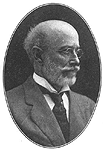TULIO LARRINAGA

[Puerto Rican Cultural Institute]
Resident Commissioner
Unionist of Puerto Rico
Fifty-ninth - Sixty-first CongressesMarch 4, 1905 - March 3, 1911
![[Previous]](https://webarchive.library.unt.edu/eot2008/20090115160750im_/http://www.loc.gov/images/prev.gif)
![[Next]](https://webarchive.library.unt.edu/eot2008/20090115160750im_/http://www.loc.gov/images/next.gif)
Hispanic Americans in Congress, 1822-1995

Tulio Larrinaga was a skillful advocate of fair government for Puerto Rico under the civil administration of the United States. While he served as Resident Commissioner, he respected the American form of government and its institutions, but he also protested against the unkept promises of the United States.
Larrinaga was born in Trujillo Alto, Puerto Rico on January 15, 1847. He enrolled at the Jesuit Seminario Conciliar of San Ildelfonso in San Juan, and later continued his studies at the Polytechnic Institute in Troy, New York. In 1871 he received a bachelor's degree in civil engineering from the University of Pennsylvania in Philadelphia. After graduation, he first worked in the United States, and subsequently returned to Puerto Rico, where he was appointed municipal architect for San Juan in 1872. He later became chief engineer of provincial works. In these positions Larrinaga greatly improved the city's and the Island's infrastructure, and was responsible for the construction of an aqueduct, numerous roads, several harbors, and the first railroad in Puerto Rico in 1890. The practical experience he gained in these efforts was to serve him well when, as Resident Commissioner, he petitioned Congress for funds for the maintenance and improvement of some of the harbors in Puerto Rico.
Larrinaga was appointed assistant secretary of the interior in a provisional Autonomist Cabinet, formed after the Spanish Government granted Puerto Rico a Constitutional Charter on November 25, 1897, giving the Island autonomy and guaranteeing individual rights.
Seven months later, on July 25, 1898, the United States invaded Puerto Rico during the war against Spain; by October an armistice was signed and the United States occupied the Island. The Organic Act of 1900, also known as the Foraker Act, ended the military occupation. Political instability on the Island during the late 19th century led to the continuous reorganization of Puerto Rican political parties. Larrinaga, at first a member of the Liberal Party, joined with Luis Muñoz Rivera to become one of the founders of the Federal Party in 1899. Most members of the Federal Party joined the Unionist Party when it was formed in 1904.
Under the auspices of the Unionist Party, Larrinaga was elected Resident Commissioner in 1904, and was reelected in 1906 and 1908. Larrinaga's first act in Congress was the introduction of a bill to amend the Foraker Act and grant U.S. citizenship to Puerto Ricans. The bill was referred to the Committee on Insular Affairs, on which Larrinaga served, but it was never successfully reintroduced during Larrinaga's tenure.
Larrinaga continuously addressed the U.S. House of Representatives on the status of Puerto Rico under the Foraker Act. On May 24, 1909 he argued that in the nine years since the passage of the Organic Act, its goals had not been fulfilled. He cited specifically that executive and legislative powers still resided in one office and that Puerto Ricans did not control their own government.
While he continued to express his desire to change the Foraker Act, Larrinaga also tried to reassure United States Congressmen concerned about press reports of Puerto Rican dissent. Larrinaga held the view that anti-American sentiments and attitudes were fabricated to sabotage congressional efforts to amend the Foraker Act.
In 1906 during his service as Resident Commissioner, Larrinaga was appointed delegate from the United States to the Third Pan American Congress at Rio de Janeiro. After serving as Resident Commissioner for three terms, he returned to San Juan, Puerto Rico, where he resumed his professional practice of civil engineering. From 1913 to 1917 he was a member of the executive council of Puerto Rico. He died in San Juan on April 28, 1917.
 Library of Congress
Library of Congress